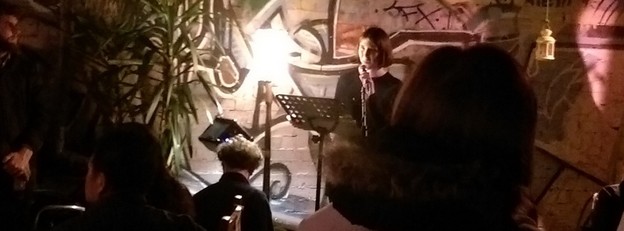Before um we begin

How do they read experimental poetry in Sydney?
There is a rich critical history examining the relationship between page and performance within the scene of the “poetry reading,” particularly when it comes to texts that can be identified with an avant-garde tradition.[1]
This series will examine experimental vocal, somatic performances, not necessarily given by Sydney poets, but within Sydney reading environments. Our environment is Australasian and ultra urban, near university campuses (spaces of cockroaches, coffee, warm weather, high rent). Sydney sites of embodied poetic dissemination (like much poetry reading globally) can be found in borrowed/shared/stolen spaces: pubs, cafes, backyards, frontyards.
We will closely listen to the voices, and closely watch the bodies of experimental poets in Sydney. I am interested in not just the way the poem might be voiced, but how it is embodied by the poet, and how the peculiar conventions and venues of poetry readings might be challenged or deconstructed by the poet-as-reader.
Poetry readings can potentially offer a flattening out of the poem (Peter Quartermain outlines how through emphasis, pauses they can elide the polyvocality of the poetry on the page and the multiplicity that different vocalisations, present on the page can offer).[2] However, by closely attending to the poet’s body at the scene of reading, and the relationship between the space of performance and the experimental page (potentially another “scene” for performance) I am not looking for an authoritative interpretation of the poem. Instead, I am interested in the points where the embodied reading might be seen to deviate from the script/score offered by the poem as it appears on the page. We will attend to these moments of slippage and discontinuity between bodies and books. Such moments, as we will see, can offer a means for an opening up of interpretative possibilities.
1. See for example, Charles Bernstein, ed. Close Listening: Poetry and the Performed Word (Oxford: Oxford University Press, 1998); David Buuck's commentaries on this site.
2. Peter Quartermain, "Sound Reading" in Close Listening, 217-230.
Sydney reading experiments: Poetry in performance